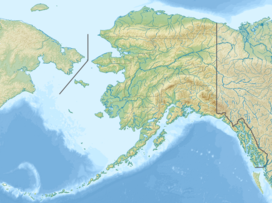Wolverine Peak is a 4,491-foot (1,369 m) mountain summit located in the western Chugach Mountains, in Anchorage Municipality, in the U.S. state of Alaska. Wolverine Peak is situated in Chugach State Park, 10 mi (16 km) southeast of downtown Anchorage, and 2.6 mi (4 km) northwest of O'Malley Peak. It is a prominent mountain on the Anchorage skyline. This geographic feature was so-named in 1963 by members of the Mountaineering Club of Alaska who found wolverine tracks in the snow near the summit.[3] The name was officially adopted in 1964 by the U.S. Board on Geographic Names.[4] A popular hike on a five-mile trail leads to the summit with views of Mount Williwaw, Denali, Mount Foraker, Cook Inlet, and Anchorage.[5]
| Wolverine Peak | |
|---|---|
 Northwest aspect, from Anchorage | |
| Highest point | |
| Elevation | 4,491 ft (1,369 m)[1] |
| Prominence | 685 ft (209 m)[1] |
| Parent peak | Mount Elliott[2] |
| Isolation | 1.85 mi (2.98 km)[2] |
| Coordinates | 61°08′05″N 149°36′51″W / 61.13472°N 149.61417°W[1] |
| Geography | |
| Location | Chugach State Park Anchorage Municipality, Alaska United States |
| Parent range | Chugach Mountains |
| Topo map | USGS Anchorage A-7 |
| Climbing | |
| Easiest route | Hiking trail class 2 |
Climate
editBased on the Köppen climate classification, Wolverine Peak is located in a subarctic climate zone with long, cold, snowy winters, and mild summers.[6] Temperatures can drop below −20 °C with wind chill factors below −30 °C. Precipitation runoff from the peak drains into Campbell Creek, which empties into Turnagain Arm.
See also
editReferences
edit- ^ a b c "Wolverine Peak, Alaska". Peakbagger.com. Retrieved 2020-05-14.
- ^ a b "Wolverine Peak - 4,491' Alaska". listsofjohn.com. Retrieved 2020-05-14.
- ^ Donald J. Orth, Dictionary of Alaska Place Names, 1967, page 1057.
- ^ "Wolverine Peak". Geographic Names Information System. United States Geological Survey, United States Department of the Interior. Retrieved 2020-05-14.
- ^ John Tyson, Best Hikes Anchorage, Falcon Guides, 2019, page 119.
- ^ Peel, M. C.; Finlayson, B. L.; McMahon, T. A. (2007). "Updated world map of the Köppen−Geiger climate classification". Hydrol. Earth Syst. Sci. 11: 1633–1644. ISSN 1027-5606.
External links
edit- Weather forecast: Wolverine Peak
- Climbing information: Winterbear.com
